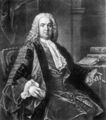Template:On This Day/February 16
1531: Mathematician, astronomer, astrologer, priest, maker of astronomical instruments, and professor Johannes Stöffler dies.
1698: Mathematician, geophysicist, and astronomer Pierre Bouguer born. He will be known as "the father of naval architecture".
1754: Physician and astrologer Richard Mead dies. His work, A Short Discourse concerning Pestilential Contagion, and the Method to be used to prevent it (1720), was of historic importance in the understanding of transmissible diseases.
1822: Statistician, progressive, polymath, sociologist, psychologist, anthropologist, eugenicist, tropical explorer, geographer, inventor, meteorologist, proto-geneticist, and psychometrician Francis Galton born.
1922: Mathematician Hing Tong born. He will provide the original proof of the Katetov–Tong insertion theorem.
1927: Botanist and chemist Friedrich Reinitzer dies. In late 1880s, experimenting with cholesteryl benzoate, Reinitzer discovered the properties of what would later be called liquid crystals; although the discovery attracted attention, interest soon faded as no practical uses were found at the time.
1960: Mathematician and crime-fighter The Eel (left) stops aquatic cryptid and alleged supervillain Neptune Slaughter (right) from infiltrating Operation Sandblast, the U.S. Navy submarine circumnavigation of the globe.
1960: The U.S. Navy submarine USS Triton begins Operation Sandblast, setting sail from New London, Connecticut, to begin the first submerged circumnavigation of the globe.
1997: Physicist Chien-Shiung Wu dies. She conducted the Wu experiment, which contradicted the law of conservation of parity, proving that parity is not conserved.
1998: Historian and cryptanalyst Francis Harry Hinsley dies. Hinsley worked at Bletchley Park during the Second World War, and wrote widely on the history of international relations and British Intelligence during the war.








